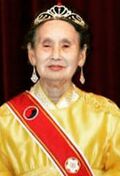Gulmi
The Empire of Gulmi 굴미제국 Goolmi Jeguk | |
|---|---|
| Motto: 천국 위임 Cheongug wiim Heaven mandated | |
| Anthem: Haneul-eul boala 하늘을 보아라 "Look to the heavens" | |
| Capital and largest city | Sangnim |
| Official languages | Gulmin |
| Ethnic groups (2018) | Gulmin 90% Other 10% |
| Demonym(s) | Gulmin |
| Government | Unitary parliamentary constitutional monarchy |
• Monarch | Ku Ha-Sun |
• Premier | Cha Jung-Hwa |
| Legislature | Imperial Assembly |
| Chamber of Councillors | |
| Chamber of Delegates | |
| Establishment | |
• Constitution enacted | 12 June 1878 |
| Population | |
• 2018 estimate | 25,250,000 |
• 2018 census | 25,178,900 |
| GDP (nominal) | 2018 estimate |
• Total | $528,756,900,000 |
• Per capita | $21,000 |
| Gini (2018) | 32.1 medium |
| HDI (2018) | 0.897 very high |
| Currency | Won (₩) (GMW) |
| Time zone | UTC+6 (Western Time) |
• Summer (DST) | not observed |
| Date format | yyyy.mm.dd |
| Driving side | right |
| Calling code | +14 |
| Internet TLD | .gm |
The Empire of Gulmi or more commonly Gulmi is a constitutional monarchy located on the western edge of the continent of ____ in Amuria. It is comprised of the entirety of the Gulmin Peninsula and the Anam Islands. Gulmi lies in a north temperate zone and is largely mountainous terrain. The capital and largest city is Sangnim.
Gulmi is a highly developed country and ranks very high on the Human Development Index. Gulmi is a regional power and is an active participant in international affairs. Gulmi's economy is largely driven by exports. Gulmi is a member of ____, ____, and ______.
Etymology
Gulmi derives its name from the ancient Kingdom of Golimai. The shortened name for the kingdom was Golmi which eventually became the name of the kingdom that succeeded Goliami in the 11th century. Visiting merchants from ___ pronounced the name of the kingdom as Gulmi. When the Kingdom of Golmi gave way to the Manguk dynasty in the 15th century the region had come to largely be known as Gulmi. This name was adopted officially as the name of the country at the end of the Manguk dynasty in 1714.
Geography, climate, environment
Geography
Gulmi occupies what is known as the Gulmin Peninsula, which extends about 1,000 kilometers from mainland ____. The mountainous peninsula is surrounded by the Sea of Manguk to the east, the Gulf of Gulmi to the south-east, the Aman Strait to the south-west and the Kingeo Ocean to the west.
Mountains cover two-thirds of the peninsula and arable plains are generally small and fall between the successive mountain ranges. The peninsula becomes more mountainous towards the north and the east, with the highest mountains found in the north. The highest mountain is Samjil Mountain, located in the northern part of the country, stands at 2,801 meters high. Lowlands are mostly located on the western and southwestern side of the country and make up about one third of the land.
The Anam Islands lie across the Anam Strait on the southwestern part of the peninsula. The three islands that comprise the island chain were formed from volcanic activity.
Climate
Environment
Government

|

|
| Ku Ha-Sun Empress of Gulmi |
Cha Jung-Hwa Premier of Gulmi |
The Empire of Gulmi is a unitary parliamentary constitutional monarchy. It is divided into three branches of government: executive, legislative, and judicial. The executive power is nominally vested into the Empress who serves as head of state, the head of government is the Premier, who along with their cabinet are the de facto wielders of executive power. The Premier is appointed by the monarch after being designated by the Chamber of Delegates.
The legislative branch of government is known as the Imperial Assembly. It is split into two chambers, the upper house is known as the Chamber of Councillors and the lower house as the Chamber of Delegates. The Chamber of Councillors is made up of appointed members and the Chamber of Delegates is made up of elected members. The Premier must command the confidence of and be a member of the Chamber of Delegates.
The judiciary is independent from the other branches of government and has judicial review of actions of the executive and legislative branches. It is lead by the Supreme Court which has 9 members and is lead by a Chief Justice. Justices are appointed by the Premier with the consent of the House of Councillors.
